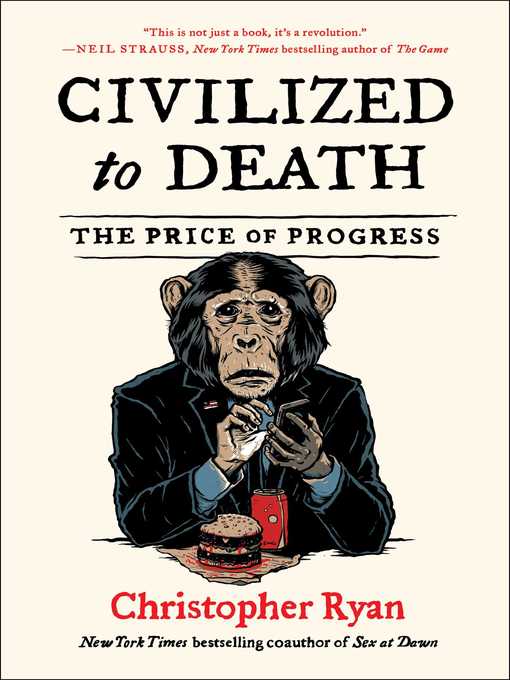
Civilized to Death
The Price of Progress
کتاب های مرتبط
- اطلاعات
- نقد و بررسی
- دیدگاه کاربران
نقد و بررسی

August 15, 2019
Hunter-gatherers were happier, wiser, and healthier than we are. Journalist Ryan (co-author: Sex at Dawn: The Prehistoric Origins of Modern Sexuality, 2010), host of the podcast Tangentially Speaking, is convinced that the idea of progress is insidious propaganda propelling the world to economic, ecological, and political collapse. "Every day," he asserts, in one of his many broad generalizations, "more people conclude that the approach to life promoted by the central myths of civilization are generating loneliness, confusion, anxiety, and despair for many of us." Most people, he claims, are unhappy, working in jobs they hate, eating food that has been leached of nutrition, living in overcrowded cities where they are cut off from nature and from one another, and suffering from diseases that "are by-products of civilization itself"--not only scourges such as tuberculosis, cholera, smallpox, and influenza, but also tooth decay, constipation, hemorrhoids, depression, gout, "coronary heart disease, obesity, hypertension, type 2 diabetes, many types of cancer, autoimmune disease, and osteoporosis." To counter what the author sees as the mistaken Narrative of "Perpetual Progress," he recommends looking closely at how our distant ancestors lived. Drawing on a diverse mix of academic and popular science, Ryan concludes that all hunter-gatherers lived "in strikingly similar ways." They were "fiercely egalitarian," had free mobility to "easily walk away from uncomfortable situations," and saw themselves "as the fortunate recipients of a generous environment and benevolent spirit world." They happily shared property, had access to all they needed, did not discriminate on the basis of gender, and eased their way to death by imbibing psychedelics. Their downfall came from farming. Once they adopted agriculture, their social structure changed, becoming hierarchical, competitive, and overpopulated. "Measures of health, longevity, security, and leisure all declined for almost everyone," writes the author, including the elites. Ryan's solution to the chaos of contemporary life is simple and simplistic: to bring "hunter-gatherer thinking into our modern lives" by forming "horizontally organized collectives," using "nonpolluting locally generated energy," and offering "a global guaranteed basic income that incentivizes not having children." A nostalgic portrayal of the prehistoric world with little relevance for our current era.
COPYRIGHT(2019) Kirkus Reviews, ALL RIGHTS RESERVED.

August 23, 2019
As humans sprint at an alarming speed toward newer notions of social progress, technological achievement, and economic development, there is the ever-lingering question: What is the cost of all of this growth? With this in mind, journalist Ryan (Sex at Dawn) explores various aspects of the uniqueness of the human evolutionary experience. Using a wide variety of both primary and secondary resources for his research, Ryan illustrates specific scenarios in which people have proven themselves capable of adapting to the strangest changes in their surroundings, and how that adaptation usually comes at the expense of the natural environment. He then moves the conversation through time, starting with prehistory and going forward, to present a look at his perspective on the future of humanity. Within this context, Ryan compares what humans need from an evolutionary standpoint with the less natural environments that we've created for ourselves today. VERDICT Recommended for YA and adult readers with an interest in cultural anthropology, current events, and apocalyptic social perspectives.--Monique Martinez, Univ. of North Georgia Lib., Dahlonega
Copyright 2019 Library Journal, LLC Used with permission.

September 30, 2019
Modernity is toxic, brutal, and insane compared to the blithe existence of ancient and contemporary hunter-gatherers, according to this fervent jeremiad. Ryan (Sex at Dawn) paints a rose-tinted portrait of nomadic “foragers” who lead healthy, happy, peaceful lives in “an egalitarian world of shared plenitude”; value “generosity, honesty and mutual respect”; work just 20 hours a week; enjoy sex with multiple partners; and respect women and LGBTQ people. Unfortunately, with the arrival of agriculture and fixed abodes, the foragers’ “gods of ease and play, pleasure and laughter” succumb to civilization’s “god of toil, sacrifice, scarcity and submission.” The results are disastrous: patriarchy, war, high-carb diets, cancer, sexual repression, environmental destruction, tooth decay, “rich asshole syndrome,” overprotective parenting, and toilets that thwart humans’ natural squatting posture. Ryan updates the centuries-old theme of mankind’s “fall from grace” with a one-sided selection of anthropological and psychological studies, while jousting with pro-civilization ideologues such as Steven Pinker. He notes the high rates of childhood mortality among hunter-gatherers, and concedes that prehistoric foragers developed agriculture to keep from starving, but reckons death “a relatively minor event” when capping a gloriously uncivilized life. Ryan’s anti-progress polemic is entertaining and provocative, but not very convincing.

September 15, 2019
In this rather gloomy treatise on the state of global affairs, Ryan (Sex at Dawn, 2010) muses about civilized societies?and how we're all basically doomed. Instead of hoping for salvation from some time-traveler from the future, he suggests we look to the past, specifically back to prehistoric hunter-gatherers. He considers various negative aspects of modern life ranging from food, dental health, and childbirth to teenage sex, communicable diseases, work environments, love, war, violence, and organized religion, and compares these current sorry states of affairs to similar, presumably preferable life events experienced by early humans or found in isolated societies. But it's not all gloom and doom. There are occasional wry observations and several humorous quotes from Mark Twain sprinkled throughout the brief chapters. His conclusion? We should return to our origins, stop obsessing over quantity?more more more!?and refocus instead on quality of life, for everyone. Whether or not readers agree with his pessimistic outlook or chafe against his fatalistic assertions, his writing is engaging, extensively documented, well-organized, and thought provoking.(Reprinted with permission of Booklist, copyright 2019, American Library Association.)

























دیدگاه کاربران